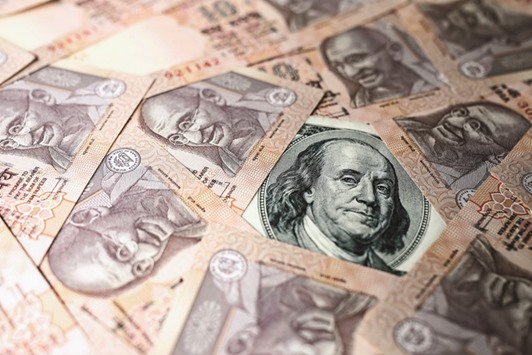India’s benchmark stock index slid to a three-week low in the final stretch of trading as losses in European equities after China weakened the yuan raised concerns about global growth.
ITC, the largest tobacco company, was the worst performer on the S&P BSE Sensex, while Hindustan Unilever fell to a three-week low.
Tata Motors paced losses among automakers after the government said it would directly adopt the more stringent BS-6 emission norms starting 2020 from BS-4 at present.
The Sensex dropped 0.7% at the close in Mumbai, with bulk of the losses coming after European equities began trading at about 1:30 pm local time.
The Stoxx Europe 600 Index slid 1.1% and futures on the Standard & Poor’s 500 Index lost 1.4%. Indian equities tumbled the most in three months on Monday as concern over a slowing Chinese economy and tension in the Middle East spurred a selloff in Asian equities.
“We sold off because of weak European markets,” Jagannadham Thunuguntla, the head of fundamental research at Karvy Stock Broking in Hyderabad, said in an interview with Bloomberg TV India yesterday. The weakness “is a temporary global phenomenon and it is a good time for investors to start their homework on stock selection,” he said.
The Sensex fell last year for the first time since 2011 as global funds sold emerging-market assets and corporate earnings failed to recover.
Around 57% of Sensex companies in the September quarter posted earnings that matched or beat estimates, versus 60% in June, data compiled by Bloomberg show.
Tata Consultancy Services rebounded from a one-month low before its results on January 12, the first quarterly report from a Sensex company.
“We will see choppiness and low volumes as the earnings season is just around the corner,” Nitasha Shankar, vice president for equity research at Yes Securities in Mumbai, said in an interview with Bloomberg TV India. “In the absence of domestic triggers, global events will influence the market.”
Overseas investors sold a net $37mn of Indian stocks on January 5. They bought $3.3bn of shares last year, the smallest in four years.
The Sensex trades at 15.2 times projected 12-month earnings. The MSCI Emerging Markets Index is valued at a multiple of 10.8.
Meanwhile the rupee dropped to a three-week low as demand for riskier assets ebbed after China weakened the yuan’s fixing to the lowest since 2011 and North Korea said it tested a hydrogen bomb.
The rupee declined 0.4% to 66.83 a dollar in Mumbai, prices from local banks compiled by Bloomberg show. It fell to 66.8350 earlier, the weakest level since December 16.
A gauge of dollar strength advanced for an eighth day, set for its longest run of gains since September 2014.
The yuan sank to a five-year low as the People’s Bank of China lowered its reference rate for a seventh day, spurring speculation policy makers are becoming more tolerant of depreciation as intervention costs rise and economic growth slows. While allowing weakness may help the Chinese economy, it risks spooking global markets, according to Japan’s Resona Bank.
“The yuan is pulling all other Asian currencies lower,” said Paresh Nayar, Mumbai-based head of currency and money markets at the local unit of South African lender FirstRand.
“A deepening slowdown in China will have an impact on other countries as well,” he said, adding that the dollar’s strength is also weighing on the rupee.
Investor sentiment also soured as North Korea conducted its fourth underground nuclear test yesterday, risking reigniting tensions with China and the US after months of calm even as some experts cast doubt on the full extent of Pyongyang’s claim.
The yield on Indian sovereign bonds due May 2025 was little changed at 7.74%, prices from the central bank’s trading system show.
India missed its target at an auction of treasury bills for the first time since May, leading to speculation some investors demanded higher yields amid the selloff in emerging markets.
The PBoC had shocked global markets with its yuan devaluation in August, saying at the time that it was revamping the fixing system to give market forces greater sway. Authorities in the world’s second-largest economy revived intervention in the stock market this week, seeking to stem a rout.
“Broadly, it does mean weaker Asia currencies if the yuan is weakening but it’s going to be to varying degrees,” said Mitul Kotecha, Singapore-based head of Asia currency and rates strategy at Barclays.
“Currencies like the Korean won, Taiwan dollar and Singapore dollar will be more sensitive to yuan gyrations.”

A US hundred dollar bill and Indian ten rupee banknotes are arranged for a photograph in Mumbai. The rupee declined 0.4% to 66.83 a dollar yesterday.
